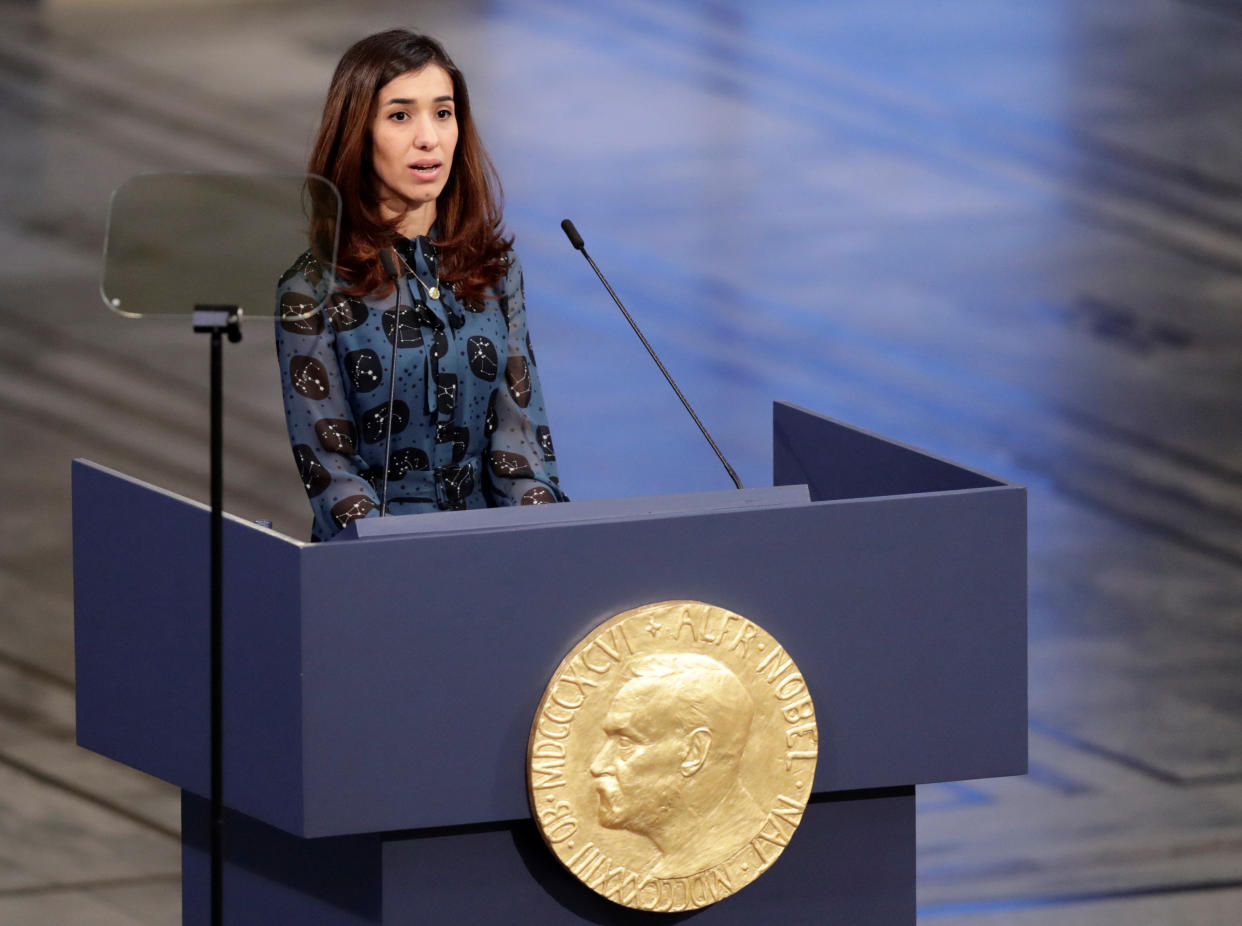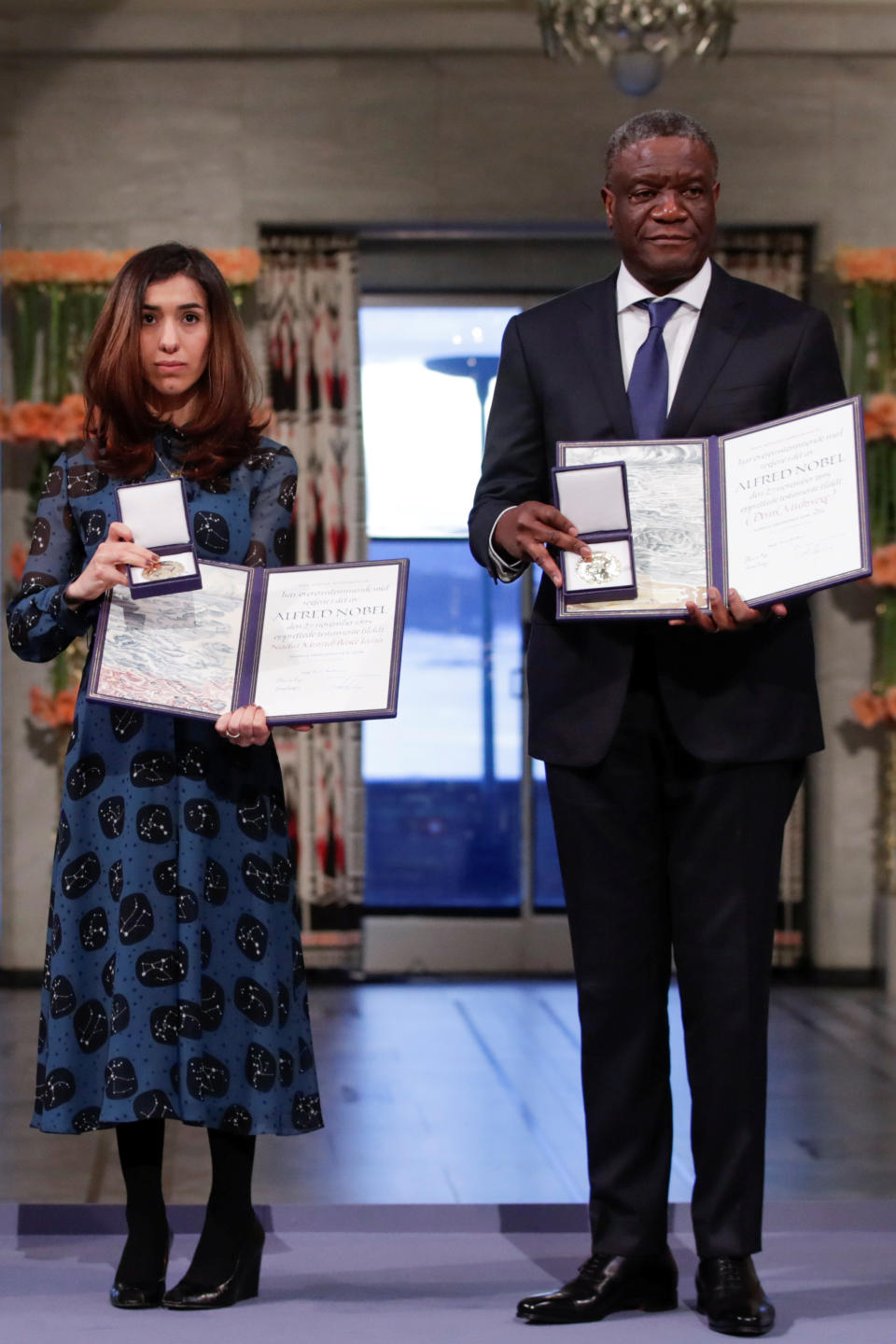Former ISIS sex slave turned Nobel Peace Prize winner Nadia Murad: 'I do not seek more sympathy — I want action'

It’s only appropriate that 25-year-old Yazidi activist Nadia Murad would accept her Nobel Peace Prize on Human Rights Day.
At the Nobel Peace Prize Award Ceremony in Oslo, Norway, on Monday, the former ISIS sex slave-turned-humanitarian took the opportunity to call for more action to advocate for and protect the women and children who are subjected to sexual violence around the world.
“Let us raise our voices together and say: No to violence, yes to peace. No to slavery, yes to freedom. No to racial discrimination, yes to equality — and to human rights for all,” said Murad, who accepted the annual award alongside fellow Nobel Peace Prize winner Denis Mukwege. “I hope that today marks the beginning of a new era, when peace is the priority, and the world can collectively begin to define a new roadmap to protect women, children and minorities from persecution — in particular, victims of sexual violence.”
As the first Iraqi person and the second-youngest honoree to take home the prestigious award (the youngest was then-17-year-old Malala Yousafzai in 2014), Murad announced that she will be donating her $500,000 prize to help victims of sex crimes.
And she will continue to hold the global community accountable for standing by as “6,500 Yazidi children and women became captive and were sold, bought, and sexually and psychologically abused,” she said in her powerful speech. “It is inconceivable that the conscience of the leaders of 195 countries around the world is not mobilized to liberate these girls. What if they were a commercial deal, an oil field, or a shipment of weapons? Most certainly, no efforts would be spared to liberate them.”

Through her work, Murad forces world leaders to recognize — and condemn — how sexual assault and rape are used as weapons of war around the world. Her advocacy started with her own brutal experience: On Aug. 3, 2014, militants from the Islamic State group raided her village of Kocho in northern Iraq. Only 21 at the time, she had dreamed of being a teacher or opening a beauty salon until her family and her freedom were ripped away from her.
“This dream became a nightmare. Genocide took place. As a consequence, I lost my mother, six of my brothers, and my brothers’ children,” Murad recounted in front of a teary audience at the ceremony. “Every Yazidi family has a similar story, one more horrible than the other because of this genocide.”
Murad and thousands of other Yazidi women were taken to Mosul, where they all became sex slaves who were raped on a daily basis. “At some point, there was rape and nothing else. This becomes your normal day,” Murad wrote in her 2017 memoir The Last Girl: My Story of Captivity, and My Fight Against the Islamic State. After months of being repeatedly sold off and sexually abused, Murad was able to sneak out of the compound where she was being held captive, and with the help of a Muslim family, she reached a refugee camp and later found safety in Europe.
Since escaping in November 2014, Murad has refused to shy away from the atrocities and horrors she faced. Instead, she uses her harrowing story to fight for women and the estimated 3,000 Yazidi people still being held in captivity by ISIS.
By unapologetically talking about her experiences, she refuses to let world leaders turn a blind eye to the way that women are used as weapons of war. Murad has earned praise from global leaders such as German Chancellor Angela Merkel, who passed legislation to open Germany’s doors to more than 1,000 Yazidi women and children, and from Hillary Clinton, who worked to change the way Americans view human trafficking with former U.S. Secretary of State Madeleine Albright. A recent documentary by Ryot (which is owned by MAKERS’ parent company, Oath) called On Her Shoulders follows Murad’s tireless work to bring “ISIS before the International Criminal Court on charges of genocide and crimes against humanity.”
There are moments when Murad feels that she is using her platform to bring attention to the unspeakable violence “without having achieved any justice,” she admitted in her speech. “The perpetrators of sexual violence against Yazidi and other women and girls are yet to be prosecuted for these crimes.”
But she refuses to give up. With the international community gathered to honor “two of the strongest voices in the world today” against sexual abuse, Murad took the opportunity to demand action — not sympathy. “Thank you very much for this honor, but the fact remains that the only prize in the world that can restore our dignity is justice and the prosecution of criminals,” Murad said. “I do not seek more sympathy; I want to translate those feelings into actions on the ground.”
Read more from MAKERS:
